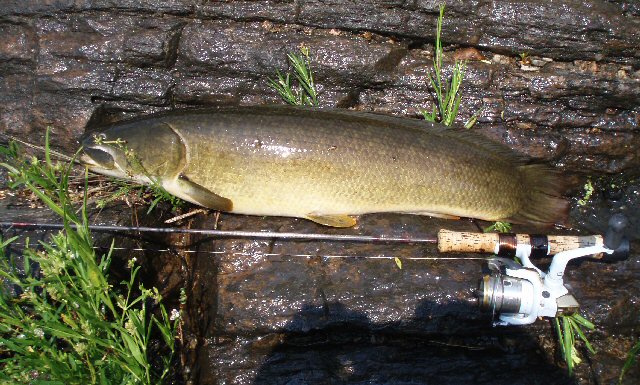|
| Query: Freshwater dogfish | Result: 2nd of 3 | |
Bowfin (Amia calva) - Wiki
| Subject: | Bowfin (Amia calva) - Wiki
| |

| Resolution: 640x385
File Size: 151564 Bytes
Date: 2007:06:29 23:16:31
Camera: u710,S710 (OLYMPUS IMAGING CORP. )
F number: f/3.4
Exposure: 1/100 sec
Focal Length: 650/100
Upload Date: 2007:08:15 23:34:10
|
Bowfin
From Wikipedia, the free encyclopedia
[Photo] Bowfin from the Coosa River, near Wetumpka, Alabama (Released). Date June 2007. Author Mike Cline http://commons.wikimedia.org/wiki/User:Mike_Cline
The bowfins are an order (Amiiformes) of primitive ray-finned fish. Only one species, the bowfin Amia calva, family Amiidae, exists today, although additional species in six families are known from Jurassic, Cretaceous, and Eocene fossils. These included the huge Leedsicthys, the biggest fish that ever existed. The bowfin and the gar are two of the freshwater fishes still extant that existed, almost unchanged from their current form, while the great dinosaurs roamed the earth.
The most distinctive characteristic of the bowfin is its very long dorsal fin consisting of 45 to 50 rays, and running from mid-back to the base of the tail. The caudal fin is a single lobe, though heterocercal. They can grow up to 1 meter in length, and weigh 7 kg. Other noticible features are the black "eye spot" usually found high on the caudal peduncle, and the presence of a gular plate. The gular plate is a bony plate located on the exterior of the lower jaw, between the two sides of the lower jaw bone.
Bowfin are not considered a good food fish compared to more popular freshwater gamefish species. They are generally considered "trash" fish by sportsmen, and are scorned for their voracious appetite for more desirable species. They will occasionally strike - and sometimes ruin with their powerful jaws - artificial lures, but they generally strike on live or cut fishes. They also naturally consume copious numbers of live crayfishes in many rivers. When hooked, Bowfin battle powerfully, offering a tremendous fight to the angler. Bowfin should be handled carefully. They are an ill-tempered, pugnacious fish, and consider themselves a match for anything - including a human being. Once in the boat, they will make every attempt they can at biting the fisherman - and they have a mouthful of very sharp teeth.
Bowfins are found throughout eastern North America, typically in slow-moving backwaters and ox-bow lakes. When the oxygen level is low (as often happens in still waters), the bowfin can rise to the surface and gulp air into its swim bladder, which is lined with blood vessels and can serve as a lung.
The list of local and alternate names the bowfin is known by is lengthy, but common ones include "dogfish", "mudfish", "grindle" (or "grinnel") and "lawyer". In parts of S. Louisiana they are called "tchoupique" or "choupique".
Bowfin are indiscriminant and voracious predators, known to eat a variety of prey from insects and crawfish to fish and frogs. Compared to many other species of their size, they have a tremendous appetite.
Males are said to turn "bluish" when breeding. The male bowfin exhibits extensive parental care. He clears an area in the mud for the female to lay eggs in, and then he fertilizes them. He hovers nearby and aggressively protects the eggs and the fry after they emerge.
http://en.wikipedia.org/wiki/Bowfin
| The text in this page is based on the copyrighted Wikipedia article shown in above URL. It is used under the GNU Free Documentation License. You may redistribute it, verbatim or modified, providing that you comply with the terms of the GFDL. |
|
^o^
Animal Pictures Archive for smart phones
^o^
|
|

